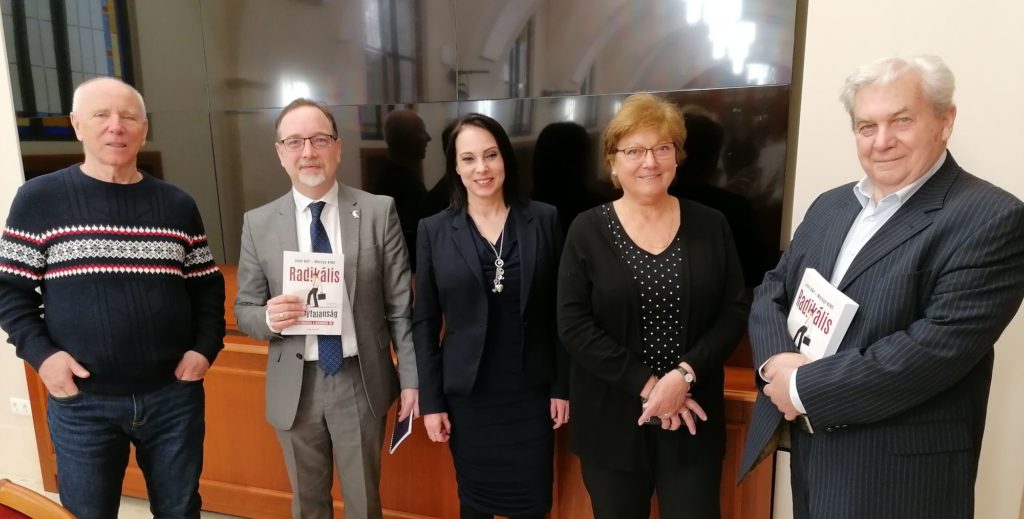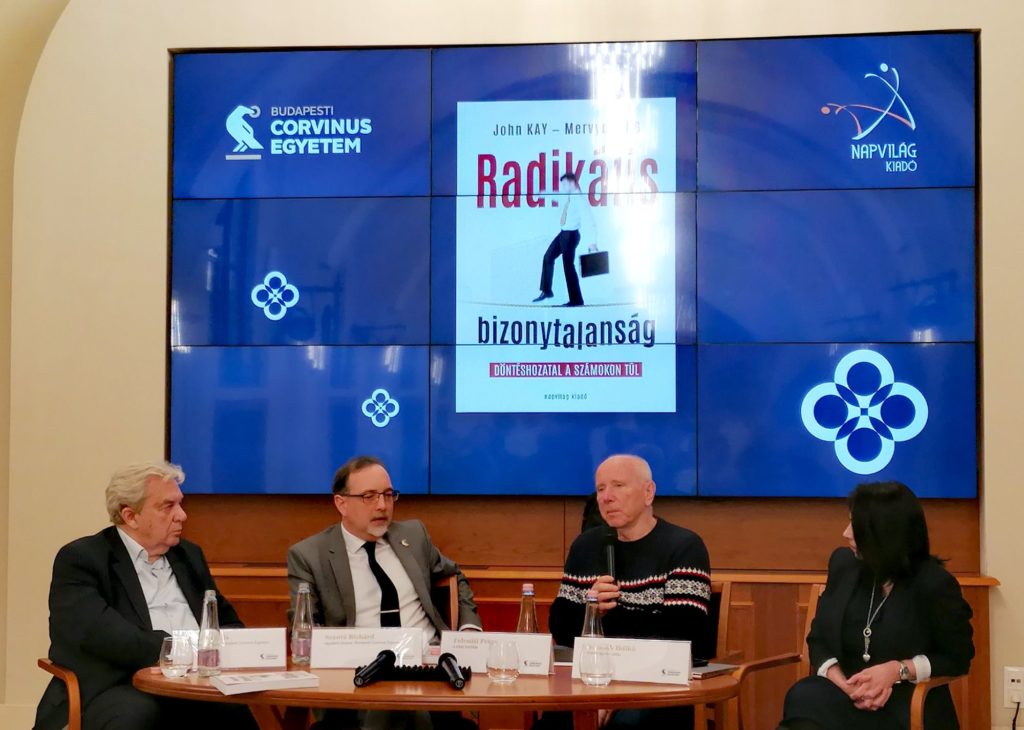A timely book full of lessons for thinking people

“A good strategy in a radically uncertain world accepts that we don’t know what the future holds,” reads the book, which was launched by Napvilág Publishers at Corvinus on Monday. One of the two brilliant economist authors is Sir John Kay, a columnist of The Financial Times, who has taught at the London School of Economics, Oxford University, and the other is Mervyn King, former Governor of the Bank of England, a member of the House of Lords, who teaches at the London School of Economics. The book entitled ‘Radical Uncertainty: Decision-Making Beyond the Numbers’ is expertly translated by Péter Felcsuti.
The host, Dean and Associate Professor, Richárd Szántó, the peer-reviewer of the book, pointed out at the presentation that the book is full of exciting stories that can be used in education at the university, and that it also deals with things, such as behavioural economics, which the authors strongly debate, that are presented as a dilemma for students by the lecturers. According to the Dean, the book is a very good representation of the reality in which we live, since the authors wrote their work before Covid, when no one expected a pandemic. “Radical uncertainty is with us, we often have no idea what will happen in a month’s time,” Szántó stated.
Professor Emeritus at Corvinus, Attila Chikán, who himself has worked on decision theory issues and started the decision theory course at the university almost fifty years ago, particularly liked the work because after the 2008 crisis, economists realised that economics has a big role to play in how global capitalism works. He added that at the same time, the work challenges many theories in mainstream economics, with a certain emotional overheatedness, according to Chikán. At the same time, he praised the book for convincing the reader of the fundamental importance of culture, the authors’ good use of referential narratives, and the importance of scientific debate, without which science cannot progress. “It is good to have this book, the translation is great, and everyone will enjoy reading it,” Chikán summarised his opinion.
Economist, former president of the Hungarian Banking Association, former CEO of Raiffeisen Bank and translator of the book, Péter Felcsuti, said that what attracted him about the book was not primarily that it also provides practical guidance for economic actors who are struggling to survive day-to-day and want to make good decisions to do so. He said that for this reason alone he would not have recommended the publication of the book to Napvilág, but rather because it contains many instructive stories, colourful examples, “the reader’s view of the world is broadened by the book,” he pointed out. “The 2008 crisis was a major turning point, an opportunity for enlightenment. Before the crisis, as a bank manager, you had the feeling that what you were doing well and conscientiously as a bank manager was reassuring; during the crisis, you realised that a lot of things in global capitalism were not working as you thought they would,” Felcsuti added. The translator mentioned as a strength the fact that the authors deal with the basics of how we decide on a large number of decision-theoretic problems.
As an example, Felcsuti cited the example of Barack Obama from the book: In spring 2011, the US President met with leading national security experts at the White House. The question, which later proved to be one of the determining decisions of his presidency, was whether to approve the raid on the complex of buildings in the Pakistani city of Abbottabad where Osama bin Laden was believed to be staying. One CIA chief was 95 per cent certain that bin Laden was there. The majority guessed a probability of 80 per cent, but some only 40. The President summarised the discussion by saying that he could not wait to make this decision until he had more certainty. Obama would later say: in that situation, what you actually got was uncertainty disguised as probabilities instead of useful information. As you can see, Obama understood his job well in this very delicate situation, while in the banking crisis, top bank executives passed the management of uncertainty to risk managers, the book says.
At the book launch, Ildikó Szemők, editor of the book and an employee of Napvilág Publishers, asked the audience what they thought about artificial intelligence (AI), which is also discussed in the book. To the question of whether AI will help in the future, Chikán said that it is already clear that AI will play an important role in practice in the future, but added that for now we do not yet know what we do not know. Felcsuti said it is important how AI can change the way society works. He added that jobs in the US have already been examined and the picture is that 40 per cent of jobs today will disappear in 30 years because of AI, including a significant number of jobs requiring high skills such as medical and banking professions.
The book will be interesting reading not only to professionals, but also to anyone who is interested in thinking about fundamental issues and the cultural and historical details of science.
Katalin Török

Images: Napvilág Publishers